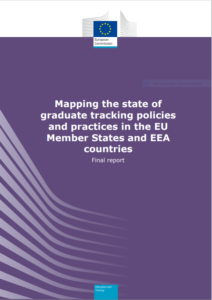Final report of the EU Study “Mapping the state of graduate tracking policies and practices in the EU Member States and EEA countries” published
This study maps the system-level approaches to higher education and vocational education and training graduate tracking across the European Union and the European Economic Area, and their progress towards achieving the requirements of the Council Recommendation on tracking graduates.

It finds that about two thirds of the countries have system-level graduate tracking in higher education and vocational education and training. The remainder will have to make considerable improvements if they are to establish system level graduate tracking in the next five years. Ongoing reforms indicate an increasing use of administrative data and a combination of administrative data and surveys to track graduates. The involvement and cooperation of key bodies, including those in charge of the policies and those holding the data and the methodological expertise, are key to successful tracking.
A benchmarking of national graduate tracking measures shows that the most significant areas for improvement are a) the coverage of the whole graduate population in both vocational education and training and higher education; b) the inclusion of all (including cross-border) graduates and drop-outs; and c) having a longitudinal approach to tracking. A first survey among higher education institutions found that graduate tracking is generally well-embedded in higher education institutions across EU and EEA countries.
The study was coordinated by ICF (BE), with CHEPS (NL) and 3s as consortium partners.
Contact: Sigrid Mannsberger-Nindl
Please find attached the link to the final study report.

